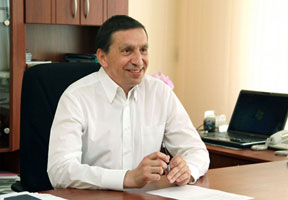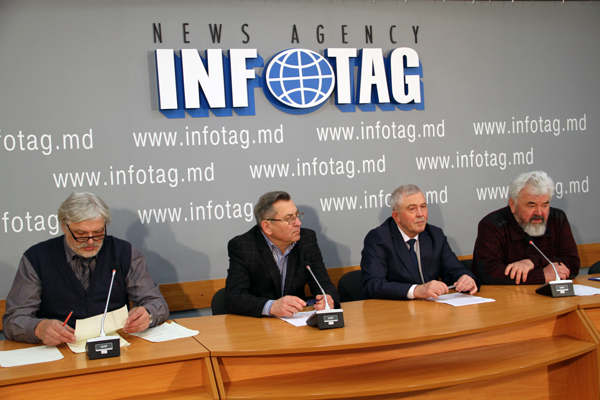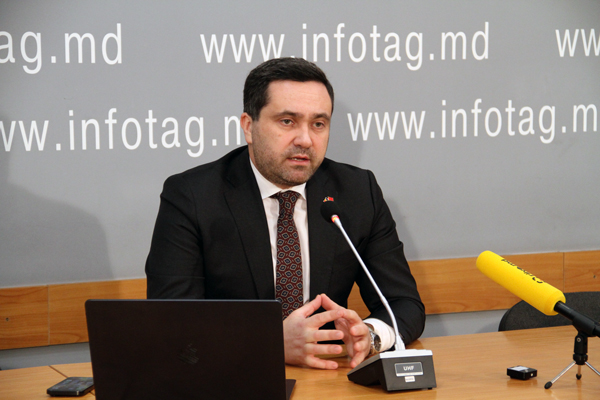Interview
„IF YOU STAND STILL, OTHERS GO FORWARD, WHILE YOU FALL BEHIND.”

The interview with the President of FinComBank Victor Hvorostovschii for Newsmaker.
This year FinComBank marks the 25th anniversary. The FinComBank President, Victor Hvorostovschii, shared in an interview for Newsmaker the details of how the bank was created and faced the ‘cold shower’ of 1998 and 2008, why it was decided to reorient the back services towards small business and why the information security is one of the most important issues for the bank today.
„Deposit rates exceeded 100-200% per annum, and loans were at 300-400%”
You are one of the few Moldovan bankers who have managed to be in the leading position of the bank for so long. How have you managed to do that?
Well, actually, I haven’t thought about it: 10, 15 or 20 years. These figures do not make much sense. I just like to do what I do, and I work. Although it’s been said that, after a while, it is good to change the job, yet as an alternative for that I would say that our economy offers us new challenges that you have to face every five or six years.
It seems that the 1990s were not long ago, but a quarter of a century has already passed since the founding of FinComBank. Tell us how did everything happen?
It was very interesting. I was the deputy director of a local branch of Vnesheconombank (a government-owned bank serving the foreign economic affairs of the USSR). When Vnesheconombank collapsed, we started thinking about what we could do in order to be useful for our clients who were served in that bank. So, we decided to create a commercial bank that could conduct international transactions and settlements, provide different types of services, as we already had the necessary background of how to do it well.
Whom do you imply by saying „we”?
Initially, when the bank was created there were four of us, three of whom being former employees of Vnesheconombank: the Chief Accountant, Irina Podvisotcaia, and the loan officer Alexandr Marinici and I. Nowadays they do not work in the bank anymore. Of course, we didn’t have money. We were simply taking a piece of paper and writing down: „Dear Mr. So-and-So, the Director of a such-and-such company. We, an initiative group of people, plan to establish a commercial bank aimed to deal with this and that. Please consider the opportunity of your company’s participation in the creation of this bank”.
With that paper we were approaching different companies, asking them to participate financially in the acquisition of FinComBank shares. Four people responded to that request: the former Director General of „Cricova”, Valentin Bodiul, the current Head of „Autospace”, Victor Miculet, the Head of „Ruralproiect”, Ivan Stihii, and Oleg Voronin, who was running a private business. I became the fifth shareholder. Our capital was about 50 thousand dollars. At the time, in the early 1990s, that money was enough to organize the bank’s activity.
Even now, this money is a very huge amount for most people. How long had you been looking for this money?
About a year. I won’t be wrong if I would say that I held about hundreds of meetings in that respect. When the bank started its activity, it got easier. We engaged then additional shareholders who gave more money for development. Our shareholders included „Tutun-CTC” Tobacco Company, „Incon” Holding of three canning factory, „Pamyat Ilicha” Collective Farm, Ungheni Carpet Factory and others.
What was the bank initially engaged in?
In the first month there were some economic matters, we tried to tailor the utility rooms to our needs. At first, we subsisted only on account of foreign currency exchange: we would just buy and sell foreign currency. There were four or five of us, and we had enough money. Meanwhile, we were developing: we opened correspondent accounts, started gradually attract clients, placed spare money in the interbank market. Accordingly, we started generating some incomes. When we began to take deposits, we were able and started to offer loans. In other words, by the early 1994, the bank had already sufficiently developed. We expanded during about half a year.
Bank management then and now – what is the difference?
Everything was based on enthusiasm at that time. We wanted to attract as many deposits and grant as many loans as possible. We didn’t think about such things as risks and global money management, we didn’t have so many departments; at that time we even didn’t know what anti money laundering meant. Everyone tried to create a new business. Economy was in transition: everything belonging to the state was being privatized.
As it was with loans: a person would just come and say that he wanted money for a business from scratch, and you would give it to him?
That also happened, but of course we wouldn’t give loans just because. The issue of pledges was a very serious one. A person could pledge his apartment to get a loan. And they usually didn’t come with a business from scratch. They would first go to their friends, relatives, acquaintances, and build some start-up, after which they would come to the bank and say they had already created something that worked out and wanted to develop it, but that required money.
Was it harder to attract deposits or not? After all, in the 1990s people had less money and less trust in private banks.
It was the same thing, simply times were very tough, with hyperinflation. Deposit rates exceeded 100-200% per annum, and loans were at 300-400%. It was very difficult to run a business with such rates.
Did people reimbursed loans?
Yes, of course. Many businesses suffered, but then the things gradually started to improve. Then 1998 arrived, and the dollar rate rose three times. At the time people suffered hugely, and the MDL losses in banks were very high. We lost about 30% of MDL during a month and a half. It was a terrible blow for the bank. Everyone was thinking about how to restore liquidity to pay the depositors back. Then we gave the guarantee that in six months we would return money based on the old dollar exchange rate. Of course, we suffered losses from exchange rate differences, yet we stopped the outflow of MDL deposits and kept liquidity.
How can you describe the noughties?
It was a good time for economy and the banking system. There has been an annual growth of the banking system by 20-30%. Profit as well as business appetite increased; there was a need only for resources to give loans. There was a huge campaign to attract deposits, and we put a lot of effort to find foreign partners to get external loans in order to provide our businesses with money. Everything was very interesting, but in 2009-2011, we again went through the ‘cold shower’. Another financial crisis occurred: the recession began and many investment projects as well as loans granted for them were frozen. As a result, lending from 2007 to 2010 was in the red, and our bank in 2010 for the first time ended the year with losses – 80 million MDL.
How did you account to the shareholders at the time?
It was very unpleasant and painful to attend the annual meeting of the shareholders and report that we have a loss of 80 million MDL. But thank God we had reserves – undistributed profits of previous years – and we could cover those losses. We have learnt our lesson and decided that we are not able to finance a large business and that we should switch to micro and small business. It was a right decision, which, probably, should have been taken earlier.
Why was it a right decision?
This is business diversification. Now, loans of 10-15 million MDL are an exception in our bank, while the average loan size in 2017 made up 290 thousand MDL. There are a lot of small borrowers who repay their loans quite well. They already have certain assets and basically they need money for working capital.
„The most difficult is to make people understand that times are different and another approach is needed”
What qualities are needed to run a bank?
To be a leader, to be sure of what you are doing, and that you are doing the right thing. The second important skill is to create a strong team of people who know their job very well and who you can rely on. At the same time, we have always tried to find like-minded fellows for our team, but who have their own opinion on different issues.
Many people complain about personnel crisis. How do you support your team under these conditions?
It’s quite easy to create a team, the difficult thing is to make your team understand that times, principles, approaches and responsibilities are changing. The team should be flexible: if not, then a heavy crash occurs. It comes with the job of firing some, breaking others, or looking for new team members. The most difficult is to make people understand that times are different and another approach is needed. The things we did the day before yesterday were not bad, but today we need new forms. Some people don’t keep up with these changes.
Why?
Perhaps you have to work constantly on yourself and not be satisfied with the successes you have already achieved. If you stand still, others go forward, while you fall behind. You have to move, think, work on yourself and read a lot. Banks need to understand the demands of times, and people’s psychology is changing. Today’s people differ very much from those who were 15 or even five years ago. If one does not understand this, he can lose everything.
And how do you motivate your team?
Appeals usually don’t work. There are tasks that a person performs, and we evaluate how is done. If a person or department starts to slow down, we convene a meeting and carry out an analysis of what has happened and why.
Could you please provide a specific example?
We have recently considered the situation with the deposits of individuals. There is such a term – ‘pushing’. It implies the automatic prolongation of deposits under the same conditions in force at the time of the signing contract. This made us secure in due time a very stable base of depositors and growth in money in deposits. But today, the bank’s liquidity is over 50%. We do not have where to place money, that’s why the interest rates on government bonds (GB) and on loans are decrease. Do we need this ‘pushing’ of depositors today or not? No, we don’t. We have now canceled it and introduced a system to notify the depositors of the maturity date of their deposit via SMS notification. We also develop our Fincompay system, enabling to manage accounts online while being at home. An increasing number of our clients prefer this system.
We live in a time when banks have too much money. We attract short-term MDL deposits for individuals at 5.5% per annum. 40% of the amount is taken by the National Bank as a reserve, paying to us 3% for them; lending in the banking system as a whole in 2017 decreased, and the GB rate is now less than 6%.
As for the issue of mid-level managers (team) – we’ve already talked it over. What about all your employees? How do you motivate them? You have about 700 people working in the bank.
Training is mandatory: cashiers, operators, customer relationship specialist – everybody receive training. They should know new products, new tasks. We don’t only conduct training courses, but also meetings where we tell our employees what is happening in the bank and in the system. And our people not just receive salary: our bank has a reward system applied to everybody, starting with the cashier and ending with the President of the bank. That’s why, the salary of two persons taking similar positions may differ by 1.5-2 times.
How do you motivate yourself for development and self-improvement?
First of all, you discuss the situation with respect to the bank, the banking system and the economy with your team. In the course of discussions you begin to feel the needs and demands from people. And, of course, you analyze a lot of information from the Internet. You see what other bank structures in other, more advanced countries do. Of course, you read books where you might find many clues about economics and psychology. After all, banking business is not just figures, but also psychology and behavior of people. There are also some courses, forums and so on.
What kind of psychology and business management books would you recommend?
There are many of them. For example, Richard Thaler and Cass Sunstein ‘Nudge. Choice Architecture’, David Hanson and Jason Fried ‘Remote. Office not Required’, Clayton Christensen ‘The Innovator's Dilemma: When New Technologies Cause Great Firms to Fail’.
„The door to my office is always open – people know that they can come and discuss any problem freely and without prior appointment”
Please describe your usual working day.
My working day starts at about 8:30 – 9:00 a.m. with reading the correspondence. Then the most complex issues that require great mental effort are addressed. I plan my day in such a way as to deal with these issues from 10 to 12 a.m. while your mind is still fresh. In the afternoon, the bank’s Management Board usually holds the meetings, or settles easier matters related more to development. Some unscheduled matters always arise along with these activities. The door to my office is always open – people know that they can come and discuss any problem freely and without prior appointment.
When does your working day finish?
My working day finishes at least at 7 p.m., at most at 9 p.m., but not later. You can work longer, but that’s wrong. A few days like these and your head stops thinking, and you’re just waiting for Sunday. It’s ok to work to the max, but do it in the most difficult times, when it's really necessary – every five years, maybe. If you have a good rest and a fresh mind, then you are able to resolve all issues and tasks two times faster.
For example, I’m working on the information security now. It’s a very difficult issue for me, first of all because it’s still little known to me, so every Monday we meet at 10:00 a.m. I’m thankful to have next to me three or four people who help to address this situation, and I basically act as a moderator, taking the discussion in the right direction. Considering that now everyone switches to online regime, to the remote customer service – this is a very important issue. I didn’t even expect it to be so complex.
Did you manage to work this out?
Yes, I did, according to the ‘step by step’ system. You have set an objective, broken it into steps, and start step by step achieving it. We meet every Monday to discuss this issue – what has already been done, what has not been done, and why. We discuss how to improve this. We create plans for five days, and next Monday we meet again. As a rule, all these plans are accomplished and also without delay, and it’s wonderful.
Do you have any hobbies not related to your work?
Sport. I attend sports club. Communication with people on various topics not related to my work and physical activity is what I find there. It’s really cool. I try to find time for a short workout at lunch break. I can afford 1.5 hours of lunch time to go to train at this time. When you’re working before lunch, then you go to work out, after it you feel as you just started to work.
And in conclusion – a traditional question about your future plans.
It’s said that if you want to make God laugh, tell Him about your plans, yet now our bank aims to get a 5% share (the current one is 4%) in the banking market. This is a difficult task, since other banks don’t stay still. Another task refers to more important indicators – a share of 10% or higher (the current one is 3%) in the market of lending of individuals. The share of loans granted by banks to micro and small businesses makes up 22%, it needs to be maintained and secured. We expect tougher competition in this segment, especially given that small business is very flexible: people go where it’s better, without being linked to a particular bank.
This is good news that an increasing number of clients are choosing FinComBank. Our clients are more and more businesses, entrepreneurs and ordinary people!
And, of course, we are looking for an investor from Europe or the US who, together with us, would help business to develop further and withstand not only increased competition but also the growing demands of our existing and potential customers.
The interview is published on a commercial basis.
Comments [ 1 ] Add Comment
-
Hi is a banker with a big expiens...
























Add Comment